The Crucial Role of Hearing in Speech Development
Hearing is one of our most critical senses, especially when it comes to the development of speech and language in children. From the very first days of life, hearing plays a pivotal role in how we acquire and learn to use language. In this blog, we will explore the importance of hearing in speech development and why early intervention is vital for children with hearing impairments.
The Link Between Hearing and Speech Development:
Hearing is the foundation upon which children build their understanding of language. It allows them to listen to and interpret the sounds around them, forming the basis for speech comprehension and production. The first few years of life are particularly crucial, as this is when the brain is most adaptable and ready to learn from the auditory environment.
1. Sound Recognition and Imitation:
Children learn to speak by imitating the sounds they hear. They start by babbling and gradually form words and sentences by copying the speech of those around them. This process begins in infancy – a period characterized by rapid auditory development.
2. Language Comprehension:
Before children can express themselves verbally, they need to understand language. Hearing allows them to process verbal cues, understand words and grasp the nuances of language, such as tone and rhythm. This understanding is essential for the development of both receptive (understanding) and expressive (speaking) language skills.
3. Social Interaction and Communication:
Hearing is key to social interaction, which in turn is vital for language development. Through listening, children learn to engage in conversations, understand social cues, and respond appropriately. This interaction is crucial for the holistic development of communication skills.
4. Cognitive Development:
Hearing and listening contribute significantly to cognitive development, which is closely linked to speech and language acquisition. It aids in the development of attention, memory, and problem-solving skills, all of which are important for learning and using language effectively.
Early Intervention for Hearing Loss:
Early detection and intervention for hearing impairments are crucial. Untreated hearing loss, especially in the critical early years, can lead to delays in speech and language development, impacting educational and social opportunities.
1. Newborn Hearing Screenings:
Routine hearing screenings shortly after birth can help identify hearing impairments early on. The sooner any issues are detected, the quicker interventions can be implemented.
2. Hearing Aids and Cochlear Implants:
For children with hearing loss, devices like hearing aids or cochlear implants can be life-changing, enabling them to access sound and develop language skills more effectively.
3. Speech Therapy:
Children with hearing impairments often benefit from speech therapy. Speech-language pathologists can work with these children to develop listening, comprehension, and speech skills, often in conjunction with auditory devices.
Promoting Healthy Hearing:
While genetics and certain medical conditions can affect hearing, there are also environmental factors to consider. Protecting children’s ears from excessive noise, monitoring ear infections, and maintaining overall ear health are important for preserving their hearing capabilities.
Conclusion:
The importance of hearing in speech and language development cannot be overstated. It is fundamental to how children learn to communicate and interact with the world around them. Understanding this link underscores the necessity of early hearing screenings and interventions. By ensuring that children have the best possible auditory experiences, we can support their journey in acquiring and mastering the invaluable skill of language. If you have concerns regarding your childs hearing contact TALK Thearpy Services to request a hearing screening to determine if a referral to an Audiologist would be warranted.

